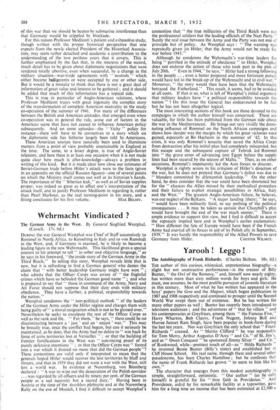Wehrmacht Vindicated I
The German Army in the West. By General Siegfried Westphal. (Cassell. 17s. 6d.) DURING the war General Westphal was Chief of Staff successively to Rommel in North Africa, to Kesselring in Italy and to von Runstedt in the West, and, if Germany is rearmed, he is likely to become a leading figure in the new Wehrmacht. This likelihood gives a special interest to his attempt to tell " in sober and objective language," as he says in his foreword, the inside story of the German Army in the Third Reich." In telling this story, Westphal reveals little that is new, but it is refreshing to find a German general who denies the claim that " with better leadership Germany might have won " who admits that the Officer Corps was aware of " the frightful crimes which have so befouled the German good name " ; and who is prepared to say that " those in command of the Army, Navy and Air Force should not suppose that their duty ends with military obedience. They have a further, a political, responsibility towards the nation."
Westphal condemns the " non-political outlook " of the leaders of the German Army under the Hitler regime and charges them with being guilty of " a moral resignation which is not to be glossed over." Nevertheless he seeks to exculpate the rest of the Officer Corps as well as the rank and file. " For them," he says, " there could be no discriminating between a ' just ' and an ' unjust ' war." This may be broadly true, once the conflict had begun, but can it seriously be maintained, as he does, that the Army had no ddire to " win back by force of arms territories lost at Versailles " ; or that the building of frontier fortifications in the West was " convincing proof of its purely defensive intentions " ; or that the Officer Corps was " forced into a war which it desired no more that did the German people"? These contentions are valid only if interpreted to mean that the generals hoped Hitler. would recover the lost territories by bluff and threats, and that in 1939 they did not want a war with the West, still less a world war. In evidence at Nuremburg, von Blomberg declared : "A war to wipe out the desecration of the Polish corridor ... was regarded by all officers and by ninety per cent. of the German people as a sad necessity but a sacred duty." Having been in Austria at the time of the Anschluss plebiscite and at the Nuremberg Rally on the eve of Munich, I find it difficult to accept Westphal's contention that " the true militarists of the Third Reich were not the professional soldiers but the leading officials of the Nazi Party." Surely the real issue between the Army and the Party was not one of principle but of policy. As Westphal says : " The warning was repeatedly given [to Hitler] that the Army would not be ready for war before 1943."
Although he condemns the Wehrmacht's war-time leaders for being " petrified in the attitude of obedience " to Hitler, Westphal does not endorse the action of those who took part in the plot of July 20th. " Even in 1944," he says, " Hitler had a strong following in the people . . . even a better prepared and more fortunate putsch would have led to the break-up of the Wehrmacht and to civil war." Moreover, " the story would then have been that the Wehrmacht betrayed the Fatherland." This result, it seems, had to be avoided at all costs. If that is so, what is left of Westphal's initial argument that military leaders have " a political responsibility towards the nation " ? On this issue the General has endeavoured to be fair but he has not been altogether logical.
The most interesting sections of this book are those devoted to the campaigns in which the author himself was concerned. These are valuable, for little has been published from the Getman side about the war in the Mediterranean. He brings out very vividly the domi- nating influence of Rommel on the North African campaigns and shows how slender was the margin by which his great victories were gained, especially at Bir Hacheim in the summer of '42. In this crisis, it was only Rommel's tenacity that saved the Africa Corps from destruction after his initial plan had completely miscarried, but this escape and the subsequent capture of Tobruk led Rommel into " the grave error of advancing into Egypt before the supply lines had been secured by the seizure of Malta." Then, as on other occasions, Rommel's impetuosity led the Axis forces to disaster.
Westphal is rightly severe in his criticism of Hitler's direction of the war, but he does not pretend that Germany's defeat was due to " blunders committed by dilettantish leadership." On the other hand, he does consider that the war could have been shortened but for the " chances the Allies missed by their methodical procedure and their failure to exploit strategic possibilities in Africa, Italy and the West." The greatest Anglo-American failure, he believes, was our neglect of the Balkans. "A major landing [there]," he says, " would have been militarily fatal, to say nothing of the political consequences . . . It may be taken as certain that Churchill's plan would have brought the end of the war much sooner." There is ample evidence to support this view, but I find it difficult to accept the reproach implied here and in Westphal's earlier exclamation: " How different the fate of Europe would have been if the French Army had exerted all-its forces in aid of its Polish ally in September, 1939." It was hardly the responsibility of the Allied Powers to save


































 Previous page
Previous page